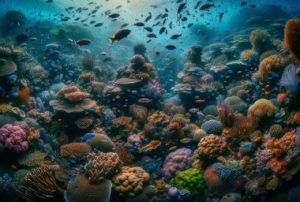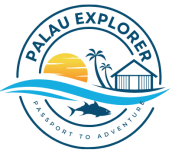Guardians of the Blue: How Palau’s Pioneering Conservation Efforts Safeguard its Priceless Coral Reefs

Palau, an archipelago of over 500 islands in the western Pacific Ocean, is a beacon of marine biodiversity, home to some of the world’s most pristine coral reefs. This natural treasure, however, faces significant threats from climate change, overfishing, and tourism. In response, Palau has emerged as a global leader in ocean conservation, implementing robust measures to protect its aquatic sanctuaries. The Palau Explorer is proud to share the story of Palau’s pioneering efforts to preserve this underwater paradise for generations to come.
The Plight of Palau’s Reefs
The challenges facing Palau’s reefs are manifold, with climate change at the forefront. Rising sea temperatures have led to coral bleaching, a phenomenon that threatens the very fabric of marine life. This, coupled with the pressures of illegal fishing practices, has placed Palau’s reefs in a precarious position. Yet, it’s not just the reefs that are at risk; the entire ecosystem, including the myriad species that depend on it, stands to suffer from these environmental assaults.
Palau’s Pioneering Conservation Strategies
In the face of these challenges, Palau has taken decisive action, embracing a multi-faceted approach to conservation that sets a global standard for environmental stewardship.
Establishing the Palau National Marine Sanctuary
Arguably the most significant step has been the establishment of the Palau National Marine Sanctuary in 2015. This sanctuary, which encompasses 500,000 square kilometers, is one of the largest protected areas of ocean in the world. It balances sustainable use with strict preservation, allowing for traditional fishing while banning commercial fishing in over 80% of Palau’s exclusive economic zone.
Adopting the ‘Reef Safe’ Policy
- In an effort to reduce the harmful impacts of sunscreen on coral reefs, Palau became the first country to ban sunscreens containing toxic chemicals, a policy known as ‘Reef Safe.’ This bold move underscores Palau’s commitment to safeguarding marine life from even the smallest threats.
- Furthering education and awareness, Palau has implemented the Panama Declaration, mandating ecological instruction for both tourists and residents, focusing on the importance of conservation and the role individuals can play in protecting the environment.
Engaging in World-Class Research and Collaboration
Palau’s reefs have become a living laboratory for world-class researchers. By collaborating with organizations such as the The Nature Conservancy and Scripps Institution of Oceanography, Palau is at the cutting edge of marine science, driving initiatives that inform global reef conservation strategies.
The Role of Sustainable Tourism
Palau Explorer, along with other responsible travel companies, plays an integral part in Palau’s conservation story. By offering eco-conscious tours that emphasize the importance of protecting Palau’s natural wonders, we help create a sustainable model of tourism. Visitors are encouraged to engage with the environment thoughtfully and to leave a positive impact on the local ecosystem.
Leading by Example
Through sustainable practices and educating our guests about the significance of our reefs, we aim to inspire other destinations to follow in Palau’s footsteps. The protection of our oceans is not just a local issue, but a global imperative, and Palau stands as a shining example of what can be achieved with dedicated effort and foresight.
Join the Cause
We invite you to experience the majestic beauty of Palau’s reefs and to join us, the Palau Explorer, in supporting these vital conservation efforts. Together, we can contribute to the preservation of this irreplaceable marine heritage, ensuring that Palau’s reefs continue to thrive for the wonder and enjoyment of future explorers.
FAQs
Which chemical sunscreens are banned in Palau to prevent damaging coral reefs?
Palau bans oxybenzone, octinoxate, octocrylene and other ingredients shown in studies to contribute to coral bleaching, defects in reef building, and disruption of essential marine life cycles. Only biodegradable, mineral-based sunscreens are allowed.
How does limiting guest numbers at island resorts prevent overtourism from harming pristine Palau reef habitats?
Government-enforced caps on the maximum number of resort guests across Palau per day prevents endless unregulated construction along fragile marine areas which would erode the pristine underwater ecosystems drawing environmental tourists there. This controlled growth is essential for sustainability.
Where in Palau are giant clam or fish nurseries that help rebuild depleted populations?
Marine biologists operate offshore coral and giant clam nurseries near well protected inlets like Ngeruktabel and Ngemelis where young specimens mature before replanting into established reef tracts restoring wildlife balances absent from dynamited or bleach devastated sites over decades past.
What local fish species benefit from the protected marine zones prohibiting commercial harvesting?
No-take reserves and exclusionary fishing policies allow depleted top predators like groupers, sweetlips and even sharks to safely repopulate while planktivores such as mackerel, yellowfin tuna and giant trevallys thriving again through generational recovery free of overharvesting pressures across these aquatic safe harbors.
Do tours allow visitors to help with hands-on coral restoration during educational experiences about conservation programs?
While extensive guest participation remains limited currently, some responsible tour guides offer opportunities visiting select nurseries witnessing scientists demonstrate rehabilitating fractured coral tabletops or delicate branching structures showing the meticulous efforts helping repopulate degraded offshore reef sites – when scheduled respectfully in controlled settings preventing accidental ecosystem interference. Talk to your tour operator to inquire about availability each season!
Can I donate directly to nonprofits based in Palau leading extensive efforts on saving threatened coral ecosystems or endangered marine life?
Yes absolutely! Please see non-profit groups like the Coral Reef Research Foundation (https://www.crrfpalau.org) to contribute directly towards science-backed conservation programs aiming protect fragile Palau marine habitats through substantiated global warming, overfishing and pollution threats requiring extensive intervention now for securing future generations ahead. Every dollar makes immense impact so contribute what possible today!
